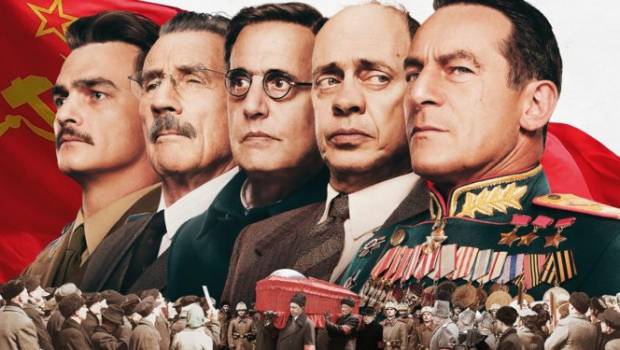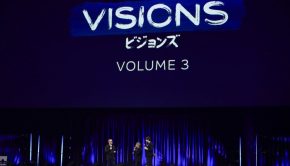The Death of Stalin – Film Review
Reviewed by Damien Straker on the 29th of March 2018
Nixco presents a film by Armando Iannucci
Produced by Yann Zenou, Laurent Zeitoun, Nicolas Duval Adassovsky and Kevin Loader
Screenplay by Armando Iannucci, David Schneider, Ian Martin and Peter Fellows based on ‘La mort de Staline’ by Fabien Nury and Thierry Robin
Starring Steve Buscemi, Simon Russell Beale, Jeffrey Tambor, Andrea Riseborough, Rupert Friend, Jason Isaacs, Michael Palin, Paddy Considine and Olga Kurylenko
Music by Chris Willis
Cinematography Zac Nicholson
Edited by Peter Lambert
Running Time: 107 minutes
Rating: MA15+
Release Date: the 29th of March 2018
The Death of Stalin overcomes several obstacles to prove that it is both funny and cinematic. The major challenge for this film was finding humour in an unlikely place. It is set in the post-WWII era of Russia when the country’s powerful leader, Joseph Stalin, is unwell. It is 1953 and people are being interrogated and murdered in cells around the country. None of that sounds particularly funny so far.
However, the hysteria of government officials narrowly avoiding danger and then the inevitable scheming and plotting to start a new regime is thankfully very humorous. It is only at the end of the film that a bleak climax takes this comic film into the type of disturbing realism it uniquely avoids.
The film has several funny actors playing Russian officials desperate to replace Stalin (Adrian McLoughlin) once he passes away. Nikita Khrushchev (Steve Buscemi) vies heavily for control once Stalin perishes but his rise and entitlement is blocked by Georgy Malenkov (Jeffrey Tambor) who unexpectedly becomes the new supreme leader.
Malenkov is a clueless man, completely out of his depth, and only says something if his advisers announce it first. Khrushchev’s main adversary though is Beria (Simon Russell Beale). Both men are at odds and posture as being capable of starting a new regime that is different from the violent totalitarian leadership of Stalin.
The non-Russian actors all speak with their natural accents. For example, Steve Buscemi reads Khrushchev’s lines with an American accent. Adrian McLoughlin briefly gives Stalin a full-blown cockney accent, which is hilarious and silly. The film’s director, Armando Iannucci, said that this is because in the Stalinist era people talked with different types of accents.
It adds to the laughs and ridiculousness and reflects how the characters aren’t what they sound like or appear to be. They posture as reformists by freeing people from their cells. Yet none of them are progressive. They’re all aggressively vying for power by rigging the democratic process and then resorting to a violent coup. This is a funny moment where Polina Zhemchuzhina, the wife of Molotov (Michael Palin), is freed from a cell and then Khrushchev insults her, unaware of her presence in the doorway next to Beria, which highlights his insincerity.
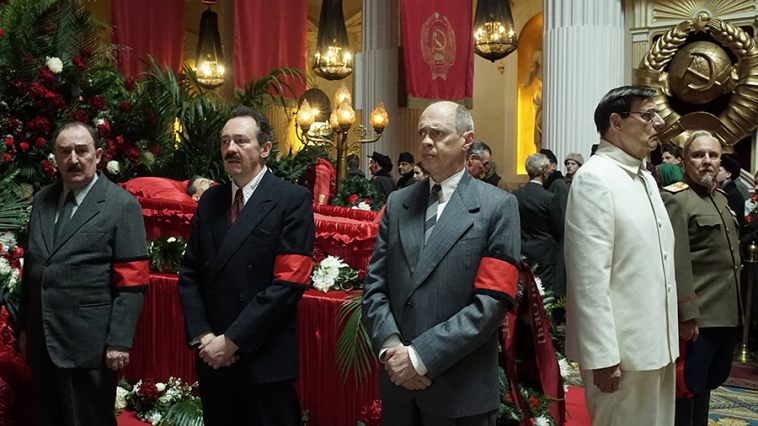
The controlling idea is that people are ugly under the surface particularly in their ideological aims. This is evident in the brutal ending, which doesn’t sit with the comedic tone. It reflects the cyclical nature of dictatorships and dog-eat-dog politics with a clever shot of someone watching over a main character’s shoulder. Yet the gruesome violence left a sour taste in my mouth.
The idea of political masks isn’t new for Armando Iannucci. He is the Scottish creator of the black American sitcom Veep and the British comedy series The Thick of It, which collectively satirise the grubby nature of politics, the lies, falsities and backstabbing. Both are as far from the optimism of The West Wing as possible.
The best way Armando Iannucci distinguishes Stalin from his television shows is through the visuals. Stalin looks cinematic, with an impressive number of extras in costumes filtering into the settings, including the interior of a funeral scene and crowds of people protesting in Red Square. A crabbing shot pushes the camera sideways and underlines the depth of one of the buildings, and the constant movement of soldiers, crowds and vehicles adds energy to the blocking of the exterior scenes.
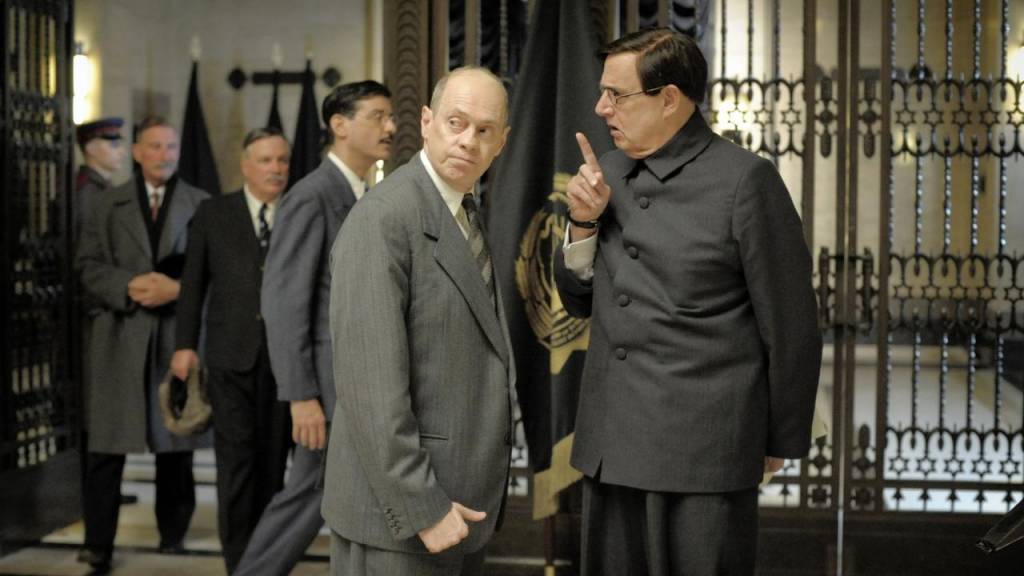
The black humour lands because the actors excel at bringing their enjoyable comic timing to their roles. There are some hilarious quips here such as someone asking, “How can you run and plot at the same time?” When Stalin’s son, Vasily, announces that he wants to make a speech, a character says “I want to fuck Grace Kelly!” stressing the unlikelihood since Vasily is a crackpot.
There’s a few clever sight gags too. Some peasants are invited into a concert performance so that the recording will sound authentic to Stalin. Someone quips that most of these people probably haven’t heard of Mozart before. If you look closely, one of the peasant women has a jar of boiled eggs on her lap. The extended gag where Stalin has a stroke and wets himself also effectively dismantles the god-complex of dictators because everyone who reluctantly helps move his body complains about the smell and being covered in urine.
Where the film slips a notch below Veep’s brilliance is that the actors are playing parts with traits we’ve seen before. Buscemi is funny but once again playing the little guy who wants to step up in the world and predictably Tambor is a flustered and nervous wreck. This stems from having actors in parts with idiosyncrasies that fit the situations but are still familiar to us. The women don’t have a lot to do, which is unlike Veep. Quantum of Solace’s Olga Kurylenko makes a brief but memorable impression as a pianist who is visibly angry with Stalin.
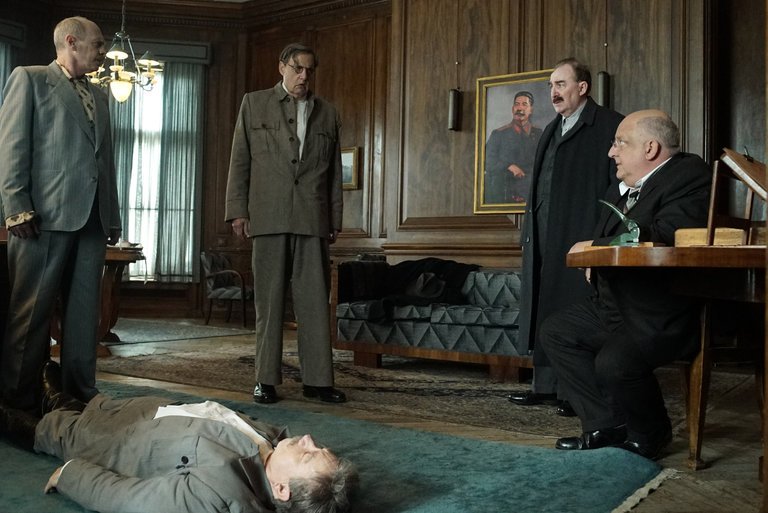
Simon Russell Beale as Beria is the standout of the cast. He dissolves into his part physically and emotionally. There’s a chilling and funny scene where he berates everyone around him and screams that he has incriminating papers on all of them. After he storms off, Malenkov insists that he was standing away from the scene so Beria didn’t mean him, and then says: “All of you can kiss my Russian ass!” This is about where the hilariousness of the comedy peaks before the film enters darker and more violent territory.
The most interesting part of the plotting is when the plans of Beria and Khrushchev overlap and unexpectedly result in casualties. The film could have used more of this complexity similar to how Veep handles difficult policies in an accessible way. The trains being stopped by Beria followed by a disruptive order by Khrushchev is one of the film’s better examples of clashing policies.
The film works on laughs alone because the actors are reliable and sometimes very funny with their quirks and personalities. Visually, Stalin’s lush settings and high volume of extras entirely justify its cinematic form. It distinguishes itself by not resembling a television production dumped onto the silver screen. The frequency of the big laughs hides its flaws, which in a funny and silly piece of revisionist history is arguably the most important quality.
Summary: The Death of Stalin overcomes several obstacles to prove that it is both funny and cinematic.


